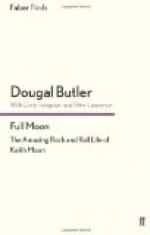“I cannot understand it,” he murmured, putting down his tea-cup as he spoke.
Austin had received him in the blue sitting-room, hung with the specimens of Mr. Brierly’s ineffectual art, and had given him tea, as he had given Barrant tea some days before. But there was a subtle difference in the manner of Mr. Brimsdown’s reception; the tone was pitched higher, with fine shades and inflections attuned for a more gentlemanly ear.
“It disposes of the suicide theory finally and utterly,” added the lawyer thoughtfully.
“The suicide theory disappeared with Robert’s daughter,” said Austin, glancing at his son, who had taken no part in the conversation.
“You think her disappearance suggests guilt?” asked Mr. Brimsdown.
“It hardly suggests innocence, does it?”
“I would not like to hazard an opinion,” responded Mr. Brimsdown, with a thoughtful shake of the head. “My experience of women is that they are capable of the strangest acts without weighing the consequences.”
“That was before the war, when women were delightfully irrational creatures, but now they’re no longer so. They’ve become practical and coarse, like men. They smoke, drink, and tell improper stories with demure expression and heads a little on one side like overwise sparrows.”
“Was Robert Turold’s daughter a girl of this sort?” asked the lawyer in surprise.
“She was not.”
It was Charles Turold who made answer, with an angry glance at his father. Austin, looking at him, gave an almost imperceptible shake of the head. Slight as the warning was, it was intercepted by Mr. Brimsdown’s watchful eye, and he wondered what it meant.
“I do not think any useful purpose can be gained by discussing my brother’s death,” Austin interposed, turning to him. “It is a very painful subject, and does no good. The police are endeavouring to unravel the mystery—let us leave it to them.”
“I was merely going to say that your brother would have given you the proofs of this statement about his marriage if he had meditated self-destruction,” Mr. Brimsdown observed. “The proofs must be in existence, of course, but I do not think that they are at Flint House. Did your brother confide the information to you beforehand—before his public announcement, I mean?”
“Shortly before his death he hinted to me of some very important disclosure which he intended to make at the proper time—some family matter—but he did not say what it was, nor did I ask him.”
His son looked at him quickly, and the lawyer doubtfully, as he made this statement, but his own glance sustained both looks serenely and equably.
“My brother did inform me, a week ago, that I would succeed to his fortune,” he added.
“That proves that your brother was aware of the illegality of his marriage at that time,” said Mr. Brimsdown, with an air of conviction.
“Why so?”




